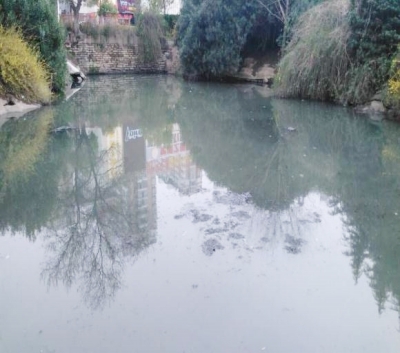This is NEWS Plus Special English. I'm Mark Griffiths in Beijing. Here is the news.
In an effort to clean up polluted urban rivers, China will give more weight to public opinion in determining which rivers are given a clean bill of health and removed from a list of polluted waters.
At least 60 percent of respondents to a government survey must conclude that a river or pond is polluted to have it included on the list of rivers that are polluted and to be remedied.
Only when more than 90 percent of residents who live near those rivers are satisfied that a river or pond is clean can the government then declare that river clean and remove it from the list of polluted rivers.
Additionally, the government will establish a monitoring platform to release updated information to the public in a timely manner on its pollution control efforts.
The Ministry of Housing and Urban-Rural Development has taken the lead on the Guide on Polluted Urban Rivers Control, an action plan it released recently.

This is NEWS Plus Special English.
New water conservation projects in Tibet have made clean water available to over 900,000 local people since 2011 thanks to surging investment into the southwest China region.
The Ministry of Water Resources said the government intensified efforts during the period from 2011 to 2015 to solve water shortages in Tibet. During this period, around 900,000 rural dwellers and urban residents benefited from the program, and fresh water has been channeled to more than 1,400 temples.
The results are attributable to the central government's investment in water conservation, which is expected to reach almost 23 billion yuan, roughly 3-and-a-half billion U.S. Dollars, by the end of the year. That's more than triple the amount in the previous five year period.
Besides water supply, the projects generate electricity for local residents, control water and soil loss and help protect the environment.
The ministry promised more efforts to guarantee fresh water, protect natural resources and improve people's livelihoods in the next five years.
This is NEWS Plus Special English.
A poverty-stricken ethnic prefecture in southwest China's Sichuan Province will offer students 15 years of free education starting next year.
In most parts of China, children receive nine years of free education. The Liangshan Yi Autonomous Prefecture, where many families are grappling with abject poverty, will take the lead, with 15 years of free education, from kindergarten through to senior high school.
The prefecture has more than 970,000 students and over 3,000 schools. The education department revealed that the quality of education, especially preschool education, has been lagging far behind other parts of the country due to poverty.
Next year, the prefecture will raise funds of almost 2-and-a-half billion yuan, roughly 390 million dollars, to build 450 kindergartens at township level and child-care centers in 5,000 villages to improve preschool education.
Since 2010, the provincial government has allocated more than 13 billion yuan in education funds to the prefecture.












